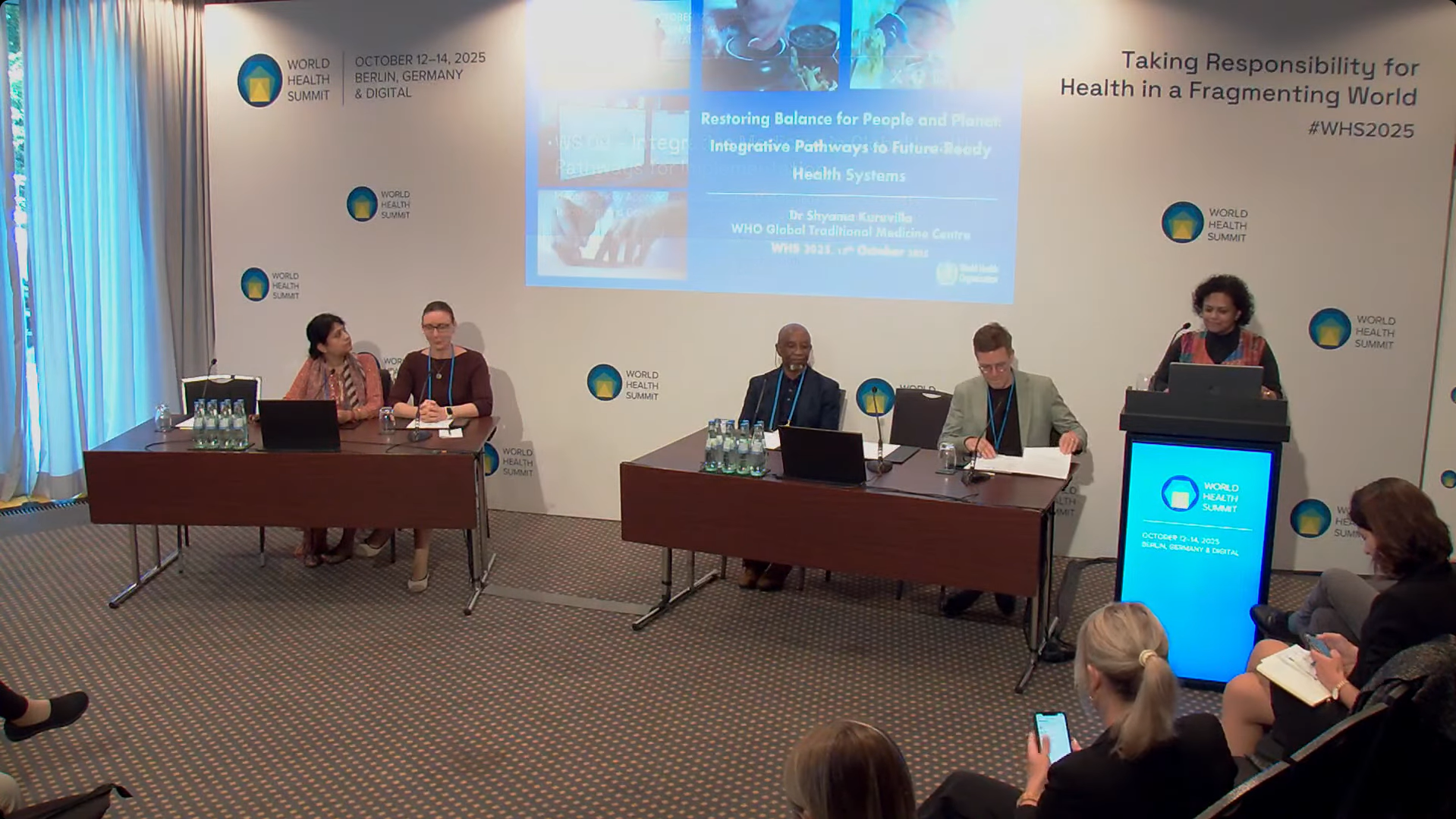
Shyama Kuruvilla, Director a.i., WHO Global Centre for Traditional Medicine speaking during the World Health Summit event
Traditional medicine was a key topic at the World Health Summit for the first time in 2025, with two dedicated sessions included in this prestigious annual event in Berlin, Germany. The first, a panel event on Sunday 12 October, titled " Operationalizing the WHO Traditional Medicine Strategy: From Global Vision to National Action ", explored how the WHO Global Traditional Medicine Strategy 2025–2034 can be translated from vision into practice. The second session was a workshop on " Integrative Medicine in Global Health: Pathways for Implementation ", held on Monday 13 October. Both events raised the profile of traditional medicine within the global health dialogue, with participants emphasizing the vital contribution of inclusive and holistic care in re-imagining people-centred health systems.
Global collaborations to integrate traditional medicine
On 12 October, Abderrazak Bouzouita, Director General of Tunisia's Ministry of Health, opened the session saying, "The world is calling for more inclusive, preventive and sustainable models of health care. Traditional medicine provides that missing dimension. It brings people, culture and nature back into the heart of the healing process". In describing Tunisia's recent advances, including the country's first national centre for traditional medicine, as well as its preparations for an Africa-China traditional medicine forum in November, he noted that these steps will advance Tunisia from being a user of traditional medicine to a global connector.
Dr Shyama Kuruvilla, Director a.i. of the WHO Global Traditional Medicine Centre, underlined that collaboration is key. She described the upcoming WHO Global Summit on Traditional Medicine , to be held on 17−19 December in New Delhi, India, as a platform where everyone is invited to learn about national and global efforts to integrate traditional medicine into our health-care systems, emphasizing, "We all have a role to play".
Lessons from country experiences
Dr Anja Thronicke, Senior Medical Affairs Manager (Oncology) at the Research Institute Havelhöhe, Germany, explained that integrative medicine has been used in cancer treatments there for more than 30 years. Dr Havelhöhe's oncology network is engaged in documenting patient journeys through personalized approaches and has published more than 50 peer-reviewed papers. Dr Thronicke said the success of integrative therapies relies on patient-centred care, evidence-based research and collaboration.
Professor Motlalepula Matsabisa, Director of the Indigenous Knowledge Systems (Health) Lead Programme at the University of the Free State, South Africa, and Co-Chair of the WHO Summit Steering Committee , shared how his department bridges traditional and biomedical sciences. "Communities are our living laboratories", he said. "We cannot exist without the communities that supply and share their knowledge".
Dr Nessma El-Nabawy, General Manager of Egypt's General Administration for Registration of Herbal Products, noted via pre-recorded video that traditional medicine has been regulated in Egypt since 1955, using the same measures as conventional medicine. "However, greater efforts are needed for scientific evidence through clinical trials and standardization to support sustainable integration into the national health system", she said.
Catalysing collaboration and accelerating implementation
Dr Kuruvilla reminded participants that traditional medicine is "Really something that's a global good for each and every one of us … not something in the past". She highlighted that emerging findings from a WHO research priority-setting exercise show that only 1% of global health research funding is currently going to traditional medicine, despite high demand for evidence and prioritization by Member States. "This is a gap that needs to be bridged," she said.
In conclusion, Dr Nicole Redvers, Director of Indigenous Planetary Health at Western University, Canada, added her perspective via pre-recorded video: "Traditional Indigenous medicine is evidence-informed through thousands of years of knowledge-gathering and experience, and is tied to spiritual and cultural processes that really teach us about ourselves and our relationship to everything around us".
Reflecting on the discussion, panel moderator Dr Hiba Boujnah, Head of International Cooperation & Partnerships, Charité – Universitätsmedizin Berlin, noted:
"Traditional medicine is about being in harmony with everything that's around us". She concluded: "We must promote traditional health to the place that it had before, and to really remove this veil of shame or of doubt around traditional medicine".
Looking ahead to the Global Summit
During the second event on traditional medicine on 13 October, Dr Kuruvilla and Professor Matsabisa joined Dr Amie Steel, Co-Director of Research Consortium in Complementary and Integrative Medicine, Australia, and Dr Sanghamitra Pati, Additional Director General, Indian Council of Medical Research, to identify key approaches, collaborative models and practical solutions for integrating traditional medicine across diverse global health systems.
Dr Kuruvilla explained the four strategic objectives of the WHO Global Traditional Medicine Strategy 2025–2034 and noted that WHO has been "looking at a conceptual framework of how integration in systems could happen" and outlined the next steps, which include the upcoming Summit in New Delhi.
The adoption of the Strategy reflects a growing consensus that traditional, complementary and integrative medicine, when validated and regulated, can advance equity, inclusion and resilience in health care. As countries move from strategy to action, the focus will be on building trust, strengthening research and creating space for traditional medicine within national health plans.






